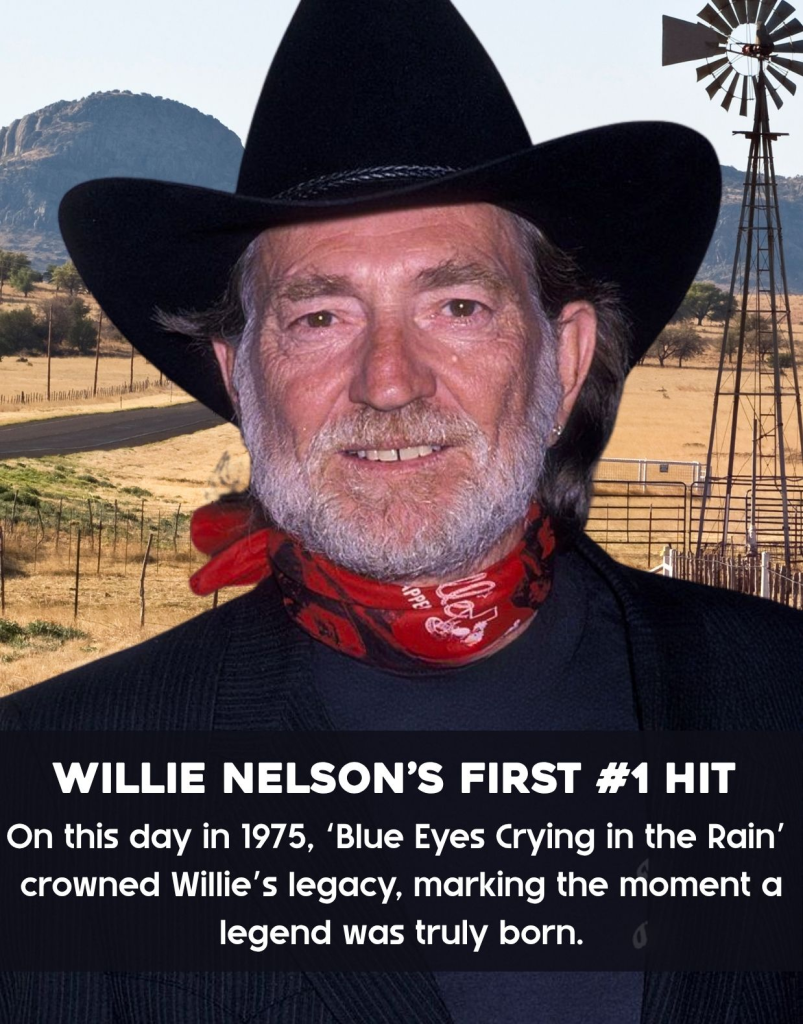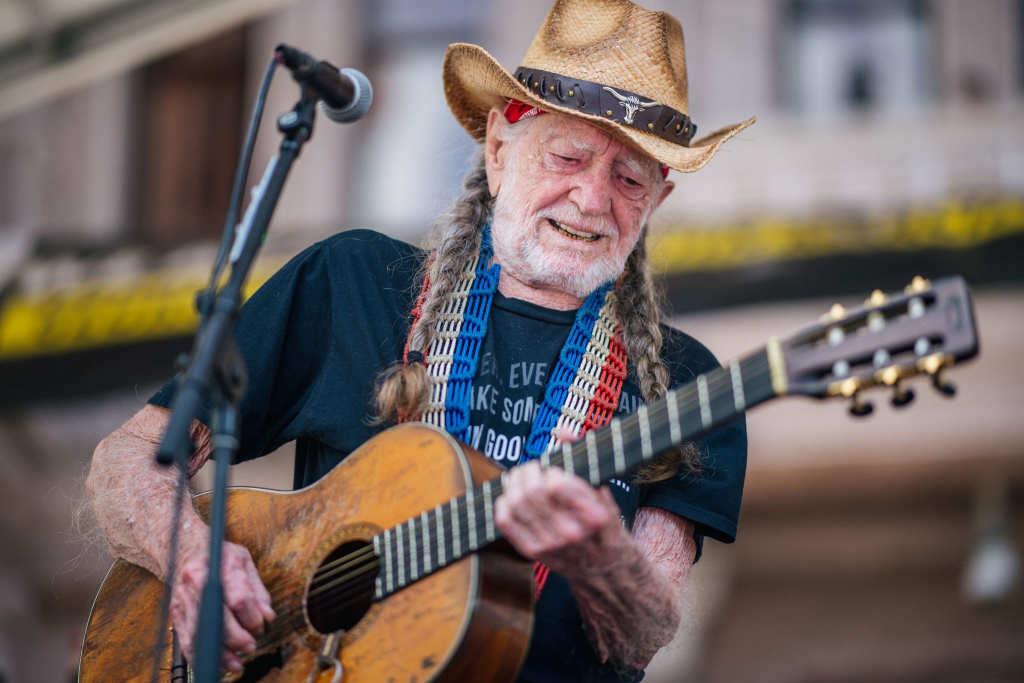It was the summer of 1975 — a turning point not just for country music, but for the man who had spent decades living on the edge of both success and sorrow. Willie Nelson, then 42 years old, had already written dozens of hits for other singers. He had given Nashville some of its most enduring words and melodies — yet for years, his own voice had gone unheard.

That changed when “Blue Eyes Crying in the Rain” hit the airwaves.
The song was unlike anything dominating country radio at the time. It wasn’t a glossy Nashville production. There were no lush string sections, no walls of sound. Instead, there was silence — the kind of quiet that draws you in. A gentle guitar. A mournful vocal, soft but unbreakable. And a story that every listener, somewhere deep inside, already knew: the ache of love lost, remembered through tears and time.
When the song climbed to No. 1 on the Billboard Country chart on October 25, 1975, Willie Nelson’s life changed forever. After two decades of being dismissed as “too weird” for the mainstream, his moment had finally arrived.
But the story of “Blue Eyes Crying in the Rain” began long before that day — and its legacy reaches far beyond a chart position.
The Song That Waited 40 Years
Written by Fred Rose in the 1940s, “Blue Eyes Crying in the Rain” had been recorded by several artists before Willie ever touched it. Roy Acuff sang it first, then Hank Williams brought it to life in his raw, heartbreak-laced baritone. But none of those versions captured the quiet devastation that Willie would bring.
When Willie began recording his album Red Headed Stranger, he wasn’t trying to make a hit. In fact, Columbia Records executives nearly canceled the project, calling it “too sparse,” “too sad,” and “too strange.” The album told the story of a preacher who kills his unfaithful wife and wanders through the West haunted by guilt — not exactly the radio-friendly formula of the 1970s.
But Willie had a vision. He wanted the record to sound the way loneliness feels: empty, aching, pure.
“Blue Eyes Crying in the Rain” became the emotional center of that record. It was the moment when the Red Headed Stranger’s rage broke into grief, when the man behind the myth finally bled.
When the album was released, critics didn’t know what to do with it. Some called it genius; others called it career suicide. Then radio listeners started calling in. One station in Texas played “Blue Eyes Crying in the Rain” once — and the phone lines lit up.
The rest is history.

A Song That Changed the Man
Success did not come early to Willie Nelson. Born in Abbott, Texas, in 1933, he was raised by his grandparents in the aftermath of the Great Depression. He wrote his first song at age seven, sold encyclopedias, and worked as a disc jockey to survive. For years, he watched others climb the charts with his words.
He was the man behind Patsy Cline’s “Crazy,” Faron Young’s “Hello Walls,” and Ray Price’s “Night Life.” Yet, as a performer, Nashville never quite knew what to do with him.
His long hair, laid-back drawl, and rebellious spirit didn’t fit the polished image that country music demanded in the 1960s. But with “Blue Eyes Crying in the Rain”, everything that had made Willie an outsider suddenly became his strength.
Here was a man who had lived the song — who had seen dreams burn and love fade, who understood the cost of chasing freedom. When he sang “In the twilight glow I see her,” it didn’t sound like a lyric; it sounded like memory.
The song’s success gave Willie more than fame — it gave him freedom. He could finally make music on his own terms. It opened the door for the entire “outlaw country” movement, alongside Waylon Jennings, Kris Kristofferson, and Johnny Cash.
Together, they redefined American music, proving that honesty and imperfection were worth more than glitter and gold.
A Quiet Revolution in Sound
When listeners first heard “Blue Eyes Crying in the Rain,” many were struck by its simplicity. At just over two minutes long, it was almost shockingly bare — no backup singers, no studio tricks.
But that was precisely its magic.
The minimalist production gave space for emotion. Every pause, every breath, carried meaning. It was country music stripped to its bones — and in that emptiness, listeners found themselves.
Critics now call Red Headed Stranger one of the most influential albums in music history. Without it, there might never have been the modern Americana movement, nor the artistic freedom that later inspired legends from Emmylou Harris to Chris Stapleton.
It reminded the industry — and the world — that less can be more, and that the truth doesn’t need to be loud to be heard.
Legacy of a Gentle Giant
Fifty years later, the song still sounds as haunting as it did the day it was recorded. It’s been covered by hundreds of artists across genres — from UB40 to Sheryl Crow — yet no one can capture its stillness the way Willie does.
When he performs it today, his voice thinner but no less powerful, there’s a sacred hush in the air. You can hear time in his tone. You can hear the miles, the losses, the lessons. It’s not nostalgia; it’s communion.
In interviews, Willie has said he never expected the song to become his first No. 1 hit. He thought of it as “a quiet moment in a strange little record.” But that’s the essence of his legacy: the man who found eternity in simplicity.
Through “Blue Eyes Crying in the Rain,” Willie Nelson didn’t just become a star — he became a storyteller for the soul of America.
The Light Beyond the Rain
As country music continues to evolve, from stadium anthems to pop-infused ballads, there’s something eternal about that two-minute song recorded nearly half a century ago. It’s a reminder that at the core of all great art lies a single truth: emotion outlives time.
“Blue Eyes Crying in the Rain” is more than a song about loss. It’s about love remembered, faith restored, and the beauty of imperfection. It’s about a man who never stopped believing that kindness and melody could heal what the world breaks.

When the final chords fade and Willie’s voice whispers the last line — “Someday when we meet up yonder…” — it feels less like an ending and more like a promise.
A promise that love, in its purest form, never really dies.
Fifty years later, the rain has stopped — but those blue eyes still shine, reflected in every note Willie Nelson ever played, and in every heart his music ever touched.





